
Photo courtesy of Tomra Sorting Recycling
Tomra, a Europe-based equipment and technology provider, says it is developing scrap wood sorting systems that will allow global retailer Ikea to meet ambitious recycled-content targets for some of its building products and furniture items.
In a late-October webcast held by Tomra Recycling Sorting, a presentation from Ikea outlined the company's plan to use recycled-content wood, and presentations by Tomra staff members covered the current status of the wood recycling market and “challenges and solutions to bring wood full circle.”
Jan-Olof Fechter, material expert and technique engineer at Ikea of Sweden AB, outlined how Ikea incorporates sustainability and recycling into its business and what the company’s long-term goals regarding recycled content look like.
“To date, only 1 percent of furniture is reused, but 99 percent, which is equal to 800,000 metric tons of furniture, is recycled,” Fechter said of the situation in Europe. “These figures prove that recycling processes are in place and already supporting us on our way to producing greener products. However, there is still untapped potential we must start to access."
In 2020, Ikea panelboards were made of 25 percent recycled content, according to Fechter, while medium-density fiberboard (MDF) and high-density fiberboard (HDF) panels consisted of only virgin material.
In 2025, Ikea aspires to increase the amount of recycled content in panelboards to 56 percent and for MDF and HDF boards to 9 percent. Fechter said sensor-based sorting will play a role in the recovery and production of panelboards and fiberboards using secondary raw materials.
Jose Matas, segment manager for wood sorting at Tomra, said current wood recycling market trends have influenced by the energy crisis in Europe, the impacts of climate change and industry’s increased reliance on recycled content to meet its sustainability targets.
“The energy crisis is hitting hard on us in Europe,” Matas said. “Many households turn to wood as an alternative heating source, therefore further driving up the already record-high demand for wood. Combined with the general lack of materials on the market, sourcing wood in sufficient volumes and qualities has become increasingly difficult and at all-time high prices.”
Matas said to access material and maintain profitable operations, the panelboard industry has heightened its attention to recycling, to the point that “both recyclers and wood-based panel manufacturers reap competitive benefits,” according to the company.
Murat Sanli, wood sales engineer at Tomra, said a “holistic approach” can maximize recycled wood content. “To exploit the full potential of recycled wood, we must concentrate on three pillars: the collection, sorting and recycling of waste wood,” Sanli said.
Decisive for the final product quality, he added, are technology-driven sorting solutions. Tomra as a company says of the building products sector, “The industry increasingly recognizes the need to make use of waste wood as it contains valuable recyclable materials that, if properly sorted, can be used as high-quality recyclates to produce new wood-based panels.”
The webcast is available here.
Get curated news on YOUR industry.
Enter your email to receive our newsletters.Latest from Waste Today
- ReMA board to consider changes to residential dual-, single-stream MRF specifications
- Miller Environmental Group Inc. appoints CEO
- DPI acquires Concept Plastics Co.
- Laurel Mountain Capital announces investment in 5280 Waste Solutions
- Cielo investor requests annual meeting
- WIH Resource Group celebrates 20th anniversary
- NWRA: NIOSH cuts a step in the wrong direction
- Valicor Environmental services acquires Affordable Waste Management





